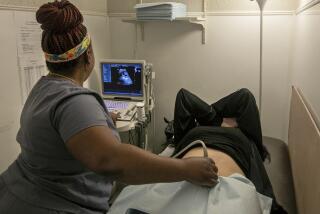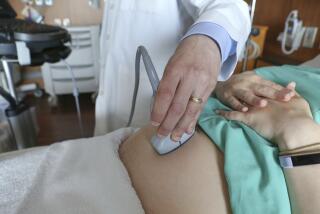State Testing for Neural Tube Defects
- Share via
This month California has begun the nation’s first comprehensive, statewide program to offer screening tests to detect neural tube defects in the unborn.
Neural tube defects are congenital abnormalities of the spine and skull that can result in death in infancy or lifelong, serious medical problems. They can be detected about 80% of the time with a simple blood test, said Dr. Maribeth Sayre, chairman of the California Medical Assn.’s Committee on Maternal, Perinatal and Child Care. The CMA, together with the American College of Obstetricians and Gynecologists, helped the state’s Department of Health Services develop the testing program.
Any California woman between her 15th and 20th week of pregnancy may give her consent, if she wishes, for her doctor to enroll her in the program by sending her blood sample to a state-approved prenatal diagnostic center. A $40 screening fee covers the blood test and further authorized tests including ultrasound or amniocentesis when they are indicated.
Two Major Neural Tube Defects
There are two major types of neural tube defects, anencephaly and spina bifida. Anencephaly, a condition in which part of the skull is missing and the brain is not properly formed, results in death before or soon after birth. Spina bifida is an opening of the bones in the spine that exposes the nerves that control the lower parts of the body. It can vary in severity depending on the size of the opening and its location on the spine. Most infants born with the condition have lifelong disabilities that may include paralysis, deformed legs or spine, or mental retardation. Many die in infancy or childhood.
While no one knows what causes neural tube defects or how to prevent them, it has been found that high concentrations of a fetal protein called alpha fetoprotein (AFP) in the mother’s blood may indicate a neural tube defect.
In about 95% of women screened, normal levels of AFP are found and no other tests are required. About 5% of women will show a positive test--more than the usual level of AFP. However, this does not prove that the birth defect exists. An elevated level of AFP could mean that the woman is further along in pregnancy than she thought or that she is carrying twins. About 50 of every 1,000 pregnant women will show an elevated AFP level in the first blood testing, the CMA said, but only one or two of these will be carrying an infant who has the birth defect.
For a woman whose blood tests positive, an ultrasound test will determine the age of the fetus or if there are twins and, in some cases, may detect a neural tube defect. If the ultrasound does not explain the blood test results, amniocentesis may help doctors decide whether there is a neural tube or other birth defect.
Lower-Than-Normal Reading
The CMA said that this series of tests will detect almost all cases of anencephaly and about 85% of spina bifida cases. Women whose blood tests show less than the normal amount of AFP will also be offered further testing. A lower-than-normal reading may indicate the fetus is younger than it was thought to be. Rarely, it could mean a chromosomal birth defect such as Down’s syndrome.
Women see their own physicians throughout and decisions all along the way are voluntary as to testing and what to do in the small number of cases where a birth defect is detected. Whether women decide to terminate or continue their pregnancies, they can be referred to counseling and support groups and special services that will help in the decision. For women who decide to continue their pregnancies, detection allows doctors to arrange for special prenatal and neonatal care that will give the baby the best chance for survival and reduce the degree of disability as much as possible.
As part of a larger trend toward employee wellness programs--such as company-provided health education, weight-loss groups, exercise programs and cafeterias with low-fat, low-sodium choices--some American businesses are beginning particularly to address the nutritional needs of pregnant employees.
According to the Worksite Wellness Media Report, produced by the Washington Business Group on Health and the U.S. Office of Disease Prevention and Health Promotion (a part of the Department of Health and Human Services), business is beginning to respond to the fact that more than half of all American women are currently in the labor force and 85% of those working women will become pregnant at some point during their working lives.
The survey of literature in the field found that larger companies are most likely to offer comprehensive or innovative health and nutrition programs. Among them are the Franklin Life Insurance Co. in Springfield, Ill., which offers its employees prenatal education and nutrition counseling. A follow-up study was done on this program, and found that after 18 months, there was a decrease in absences for pregnant workers and the workers reported improved morale. Kimberly-Clark Corp. in Wisconsin offers prenatal nutrition and breast-feeding programs, and Hunterdon Medical Center in New Jersey actively encourages breast-feeding among its employees by providing a breast pump, time to use it during working hours and refrigeration for breast milk.
Also, the March of Dimes offers seminars with audio-visual and print educational materials on nutrition during the childbearing years that is available to businesses for their employees.
More to Read
Sign up for Essential California
The most important California stories and recommendations in your inbox every morning.
You may occasionally receive promotional content from the Los Angeles Times.













